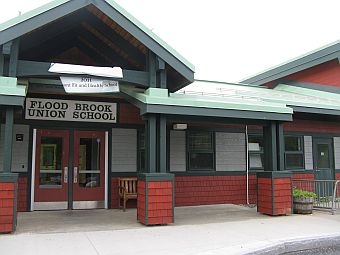 (Host) School leaders around Vermont are being encouraged under a new "voluntary merger law" to study forming larger, unified school districts that could save money and offer more opportunities for students.
(Host) School leaders around Vermont are being encouraged under a new "voluntary merger law" to study forming larger, unified school districts that could save money and offer more opportunities for students.
And that’s leading to some innovative approaches as local officials try to preserve the things they value most.
As VPR’s Susan Keese reports, a priority in Londonderry is preserving school choice.
(Keese) The towns of Weston, Landgrove, Londonderry and Peru all send their kindergarten through eighth grade students to the Flood Brook Union School in Londonderry.
Each town has a school board. Wendell Coleman says the boards don’t have much to do.
(Coleman) "Their primary function is to pay tuition to high schools. None of our four towns have a high school. None of our four towns want a high school. We are very, very much committed to school choice, at the high school level, at least."
(Keese) Coleman chairs the committee set up by the four towns to study forming larger districts, known under state law as "regional education districts."
Families in the four Flood Brook towns can choose to attend the high school of their choice, even though they’re in a supervisory union that includes Green Mountain Union High School in Chester.
Most now choose Burr and Burton Academy, an independent school in Manchester.
(Coleman) "So there is an inherent built-in friction there. Because the Windsor Southwest board has an understandable interest in our students going to Green Mountain Union high School."
(Keese) So that’s why the four towns are discussing forming their own district, with a single board. Then they hope to switch to another supervisory union that includes Manchester, which they say is more supportive of school choice.
Meanwhile, the supervisory union that includes Ludlow and Mount Holly is discussing a new alliance with the supervisory union Coleman’s towns want to leave.
Vaughn Altemus is helping to implement the new state law, known in education circles as Act 153.
He says school groups often fear that if schools don’t merge voluntarily, the state will force them to.
But he says that’s not what the law is intended to do. He calls it "an invitation to have a conversation."
(Altemus) "The system has been under tremendous stress. And we’re asking them to think more broadly and see if there are ways that they can improve it."
(Keese) Altemus says it’s impossible to predict whether more forceful measures will follow. It depends on the economy, demographics, and who’s elected to state office.
For VPR News, I’m Susan Keese in Manchester.
VPR wants to know if a school in your community is considering consolidation. Let us know in comments section below.